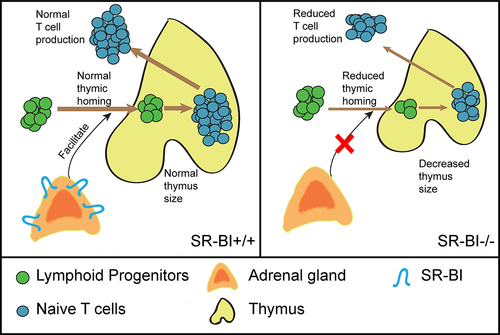Recent Faculty Publication: SR-BI (Scavenger Receptor Class B Type 1) Is Critical in Maintaining Normal T-Cell Development and Enhancing Thymic Regeneration
Zhong Zheng , Junting Ai , Ling Guo , Xiang Ye , Subbarao Bondada , Deborah Howatt**, Alan Daugherty*, and Xiang-An Li*
Abstract
Objective- Continuous T-cell production from thymus is essential in replenishing naïve T-cell pool and maintaining optimal T-cell functions. However, the underlying mechanisms regulating the T-cell development in thymus remains largely unknown. Approach and Results- We identified SR-BI (scavenger receptor class B type 1), an HDL (high-density lipoprotein) receptor, as a novel modulator in T-cell development. We found that SR-BI deficiency in mice led to reduced thymus size and decreased T-cell production, which was accompanied by narrowed peripheral naïve T-cell pool. Further investigation revealed that SR-BI deficiency impaired progenitor thymic homing, causing a dramatic reduction in the percentage of earliest thymic progenitors, but did not affect other downstream T-cell developmental steps inside the thymus. As a result of the impaired progenitor thymic homing, SR-BI-deficient mice displayed delayed thymic regeneration postirradiation. Using a variety of experimental approaches, we revealed that the impaired T-cell development in SR-BI-deficient mice was not caused by hematopoietic SR-BI deficiency or SR-BI deficiency-induced hypercholesterolemia, but mainly attributed to the SR-BI deficiency in adrenal glands, as adrenal-specific SR-BI-deficient mice exhibited similar defects in T-cell development and thymic regeneration with SR-BI-deficient mice. Conclusions- This study demonstrates that SR-BI deficiency impaired T-cell development and delayed thymic regeneration by affecting progenitor thymic homing in mice, elucidating a previously unrecognized link between SR-BI and adaptive immunity.
*Saha Cardiovascular Research Center Faculty
** Saha Cardiovascular Research Center Research Analyst
